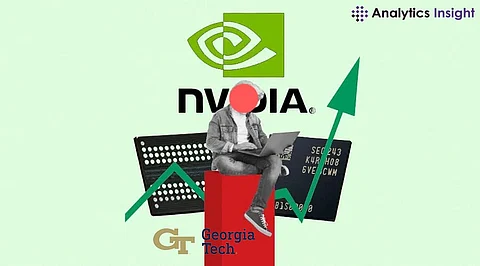

Georgia Tech's College of Engineering, in partnership with NVIDIA, has unveiled an artificial intelligence (AI) supercomputer hub that's specifically designed to teach students how to use AI. The AI Innovation Hub called the "AI Makerspace," is described by College leaders as a "digital sandbox" for students to learn and apply AI in their classrooms.
Raheem Beyah, Dean of the college and Southern Company Chair said that the AI Makerspace launch is another significant achievement in Georgia Tech's long-standing innovation and excellent education. He also thanked advanced technology and expertise of NVIDIA that led the students to make some significant contributions in the field of AI.
AI Makerspace is primarily aimed at undergraduate students, but the goal is to open up access to computational resources that are traditionally restricted to researchers or tech firms. Students will have access to the cluster online during their coursework. This will allow them to hone their AI skills in real-world situations. Additionally, Makerspace puts students in a better position after graduation as they collaborate with AI experts and shape the future uses of the technology.
It is to be noted that the AI MakerSpace is essentially a dedicated compute cluster connected to NVIDIA AI Enterprise Software. The software resides on a state-of-the-art AI infrastructure that's designed, engineered, and implemented by Penguin Solutions. Penguin Solutions offers a virtual gateway to the high-performance computing environment.
The first phase is supported by 20 NVIDIA HGX H100 systems, each of which houses 160 NVIDIA H100 Tensor Core GPUs (graphics processing units), one of the world's most powerful computing accelerators that enable and support cutting-edge AI and machine learning. The system is connected to the NVIDIA Quantum-2 infiniBand networking platform with in-network computing capabilities.
To give you an idea of how much computing power this is, it takes one second for an NVIDIA H100 to perform a multiplication operation. NVIDIA and Georgia Tech has 50,000 undergraduates and it takes them 22 years to complete a multiplication operation.
The NVIDIA and Georgia Tech partnership is a testament to the College's commitment to leading enterprise AI technology and software.
In addition, NVIDIA and Georgia Tech students and faculty will have access to a variety of resources from the NVIDIA Deep Learning Institute, including faculty-hosted NVIDIA workshops, NVIDIA certifications, a University Ambassador program, curriculum-assisted teaching kits, and an NVIDIA Developer Community Network.
Cheryl Martin, director of Higher Education and Research at NVIDIA stated that AI supercomputers offer a platform to drive new innovations that can solve the most complex challenges. Cheryl Martin also said that AI Makerspace of Georgia Tech will provide access to an accelerated computing platform to the students enhancing their skills and pushing boundaries for AI learning and AI research.
AI Makerspace complements the College's "AI for Engineering" announcements, which include the launch of Georgia Tech's first-ever minor program in artificial intelligence and machine learning and the reimagining and development of 14 core artificial intelligence courses for undergraduates. The Makerspace builds on Georgia Tech's core, theory-based AI curriculum, providing students with an on-the-ground platform to solve real-world artificial intelligence challenges, create cutting-edge applications, and showcase their AI-based ideas at scale.
The comprehensive solution of Penguin showcases tightly integrated, networking, end-to-end computing, data management, and infrastructure that enables the AI cluster to process large volumes of data with ultra-low latency.
The undergraduate students who have taken up the Fundamentals of Machine Learning (FunML) course are using AI Makerspace to perform experiments, prototypes to exhibit the ideas on AI.
AI Makerspace Omniverse a sandbox for augmented reality (AR) and virtual reality (VR) is being planned to be set up by Georgia Tech. The learning and research hub will be built on the NVIDIA Omniverse platform, which is a 3D tool and application network that allows students to connect and develop.
With AI Makerspace focusing on undergraduates, it emphasizes the need to educate students about artificial intelligence and its advanced applications specifically the generation that would be called the Generation AI, stated Mark Adams, president and CEO of SGH, Penguin Solutions' corporate parent. He also expressed his happiness about collaborating with NVIDIA and Georgia Tech to work on making AI Makerspace a reality. As AI evolves students must get the best education and have access to cutting-edge technology.
All of this is supported by Georgia Tech's partnership for an advanced computing environment (PACE). PACE provides sustainable, cutting-edge cyberinfrastructure and support, giving students the tools and support they need to make the most of the cluster.
To overcome the accessibility challenges that students may encounter in the AI Makerspace, the PACE team, in collaboration with ECE's Ghassan AlRegib, is creating intelligent interfaces and strategies to make the computing power accessible to all students regardless of their background, field of study, or level of expertise.
Join our WhatsApp Channel to get the latest news, exclusives and videos on WhatsApp
_____________
Disclaimer: Analytics Insight does not provide financial advice or guidance. Also note that the cryptocurrencies mentioned/listed on the website could potentially be scams, i.e. designed to induce you to invest financial resources that may be lost forever and not be recoverable once investments are made. You are responsible for conducting your own research (DYOR) before making any investments. Read more here.
